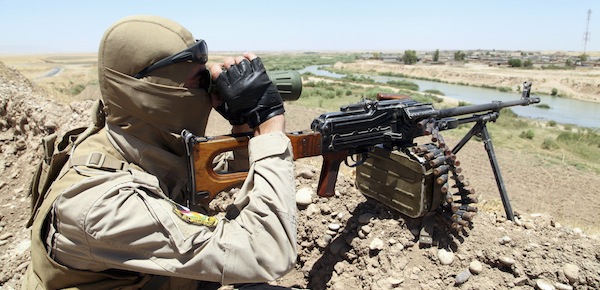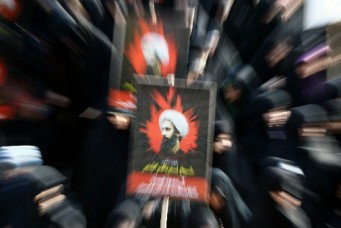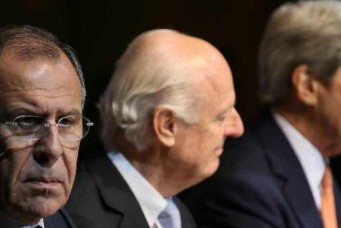America And Iran Face The Future—in Iraq
After eleven years of pursuing zero-sum security strategies in Iraq, both Tehran and Washington are slowly admitting that they have badly overreached.

A member of Kurdish security forces patrols for ISIS militants on the outskirts of Mosul, Iraq. June 22, 2014. Azad Lashkari/Reuters/Corbis.
The United States’ 2003 invasion of Iraq was the strategic mistake of a generation, with a long tail of consequence. It shook the foundation of the status quo in the Middle East and forced everyone, including the U.S. and Iran, to re-evaluate their respective positions. Today’s crisis in Iraq involving the Arab Sunni extremist group the Islamic State in Iraq and Syria (ISIS) is hardly the first time that Washington and Tehran have re-evaluated their positions publicly. Without greater collaboration between the two, it will hardly be the last. After eleven years of pursuing zero-sum security strategies in Iraq, both sides are slowly admitting that they have badly overreached.
It has long been clear that Washington’s overreach in Iraq was the invasion itself. Everything since has been blowback and damage control. ISIS’s rise in Iraq and Syria is yet another reminder to Washington that the real threat of Islamic extremism does not emanate from Iran, but rather from Sunni extremists that make up a small but determined minority. This is a lesson that should have been clear to Washington after ISIS predecessor Al-Qaeda attacked the United States in 2001.
Only recently, Iran’s overreach has come into focus: By seeking to advance its interests in concert with allies at the expense of other foreign and domestic players, the Al-Maliki government has lost control of more than a quarter of the country. Sunnis and Kurds continue to take steps that threaten Iraq’s long-term territorial integrity. Instability in the Middle East has been known to transcend borders, and for its part, Iran has no interests in an anti-Iranian, anti-Shia political or military movement establishing any sort of lasting presence next door.
Until recently, both sides operated in Iraq under the same false premise: If you provide assistance from a position of weakness, the other side interprets it as giving in—and you get negative results. This exacerbated the deterioration of security in Iraq to the point where Washington and Tehran are now choosing between bad and worse. The danger of an Iraq beleaguered by political, religious and ethnic dysfunction with a low desire to project power abroad is preferable to anti-American, anti-Iranian militias seeking a caliphate from which they can carry out their stated desire to attack both America and Iran.
Identifying their shared interests in Iraq is the easy part. Now comes the hard part: addressing shared interests requires some series of shared actions. To build any coalition that can win against ISIS—or anyone else with a similar modus operandi—Washington and Tehran both need the support of key power brokers in Iraq, and that includes one another.
For over a decade, the predominant train of thought in Washington and Tehran has been avoiding compromise because each side ostensibly enjoyed plenty of maneuverability and other options to choose from. When one side’s influence began to rise, the others’ would shrink. The escalating crisis in Iraq—combined with growing regional instability—has rendered this assumption untenable.
Rather than support or ignore a power vacuum that the Kurds, Saudis, Turks, ISIS, and other extremist groups will increasingly seek to fill, compromise is clearly the lesser of two evils. Both sides have long held valuable cards to play in collaboration with one another if a shared interest in dialogue came to the fore: valuable intelligence, deep contacts with key political players, and influence within Iraq’s complex tribal and religious networks.
Working together to stabilize Iraq politically can reinforce the fragile power sharing arrangement between Shias, Sunnis and Kurds, as well as provide a greater degree of accountability over all three sides and their use of religious and ethnic differences to advance political agendas. It would also be a huge step toward finally acknowledging an inconvenient truth: both sides become more antagonistic when they are not acknowledged as a stabilizing force in the region.
Perhaps most importantly, shared action in Iraq can provide a platform for the future—a future in which Washington and Tehran are able to engage in tactical or strategic collaboration without making headlines around the world. If shared interests are acknowledged and acted upon, the strategic significance of such a shift will likely force their conflicting ideologies to take a backseat to geopolitical realities.
For example, Washington should use this opportunity to test Tehran’s willingness to cease lethal support for anti-U.S. groups in Iraq. Tehran should respond in kind by testing Washington’s willingness to use Iraq as an incubator for building positive strategic relations. Clearly defined rules of the game in Iraq can help avoid inadvertently fighting one another, facilitate intelligence-sharing cooperation and coordination on the capture of ISIS fighters, and provide a template that can be used to varying degrees in Syria, Afghanistan, and other regional conflicts.
Skeptics in Washington often point to Ayatollah Khamenei and General Qassem Soleimani as prime examples of Iran’s opposition to the idea of a strategic opening to the United States. This assessment is less than honest. Both men have long insisted that any opening on regional security issues must address both Iranian and American concerns. Any Iranian offers of assistance to the U.S. will be packaged with an Iranian insistence on exacting a price up front. Iran will not aid American interests in Iraq without linking its assistance to America aiding Iranian interests – and frankly, Washington operates on the same premise.
American and Iranian soldiers will not be fighting side by side anytime soon, but it has long been clear that the two sides need a sustained private channel to understand and influence their respective decision-making processes – if such a private channel does not already exist. When American generals say that collaboration is possible and Iranian generals say it’s impossible, that usually means it’s already happening at some level. Discussing Iraq on the sidelines of nuclear negotiations in Vienna was a positive step, but much more needs to be done to stabilize Iraq before its political, economic and social foundations crumble.
It is fair to point out that Washington and Tehran are still at odds on many issues. But to truly be fair, one must also acknowledge the slowly increasing receptivity to discussing those matters systematically in an effort to resolve their outstanding issues. Durable political solutions require the buy-in of those with the capacity to spoil them. Now more than ever, the U.S. and Iran must find common cause in stability—in Iraq and the region at large. Neither side can produce a durable victory when key players are excluded from the dialogue.
Reza Marashi is research director at the National Iranian American Council in Washington, DC. He previously served in the Office of Iranian Affairs at the U.S. Department of State. His articles have appeared in the New York Times, Foreign Policy, Atlantic, and National Interest. On Twitter:@rezamarashi.



